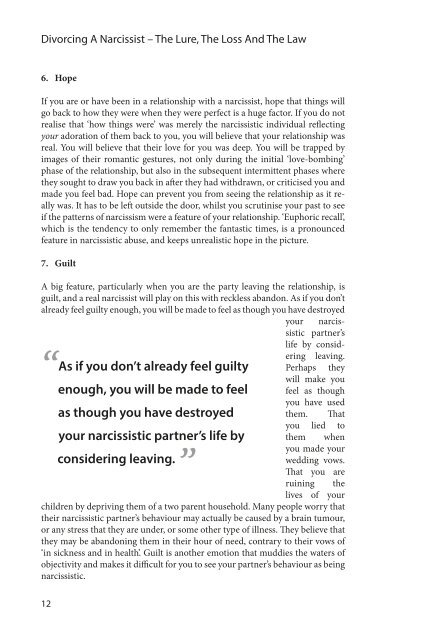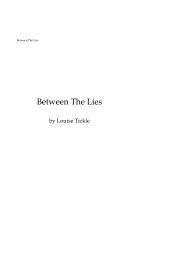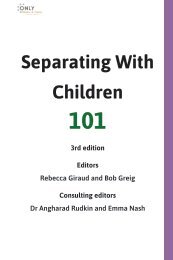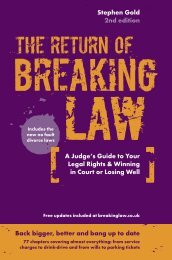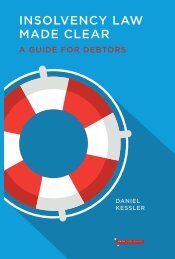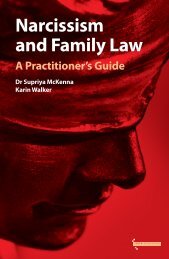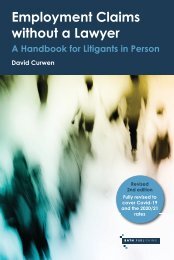Divorcing a narcissist: read the contents plus chapter 1
Separating or divorcing a narcissist or someone who has narcissistic traits can be a difficult, draining experience. This book is written for the spouse of such a personality, to support them step by step through the legal process, as well as through the difficult emotional journey that they'll be undertaking. It will help you recognise narcissistic behaviour, prime you on what challenges lie ahead and provide practical insights on how to survive the process. It will also help you work with your lawyer so you can both understand the potential pitfalls that could frustrate attempts to finalise your separation. The book is a companion volume to our book for lawyers, Narcissism and Family Law: A Practitioner's Guide
Separating or divorcing a narcissist or someone who has narcissistic traits can be a difficult, draining experience.
This book is written for the spouse of such a personality, to support them step by step through the legal process, as well as through the difficult emotional journey that they'll be undertaking. It will help you recognise narcissistic behaviour, prime you on what challenges lie ahead and provide practical insights on how to survive the process.
It will also help you work with your lawyer so you can both understand the potential pitfalls that could frustrate attempts to finalise your separation.
The book is a companion volume to our book for lawyers, Narcissism and Family Law: A Practitioner's Guide
You also want an ePaper? Increase the reach of your titles
YUMPU automatically turns print PDFs into web optimized ePapers that Google loves.
<strong>Divorcing</strong> A Narcissist – The Lure, The Loss And The Law<br />
6. Hope<br />
If you are or have been in a relationship with a <strong>narcissist</strong>, hope that things will<br />
go back to how <strong>the</strong>y were when <strong>the</strong>y were perfect is a huge factor. If you do not<br />
realise that ‘how things were’ was merely <strong>the</strong> <strong>narcissist</strong>ic individual reflecting<br />
your adoration of <strong>the</strong>m back to you, you will believe that your relationship was<br />
real. You will believe that <strong>the</strong>ir love for you was deep. You will be trapped by<br />
images of <strong>the</strong>ir romantic gestures, not only during <strong>the</strong> initial ‘love-bombing’<br />
phase of <strong>the</strong> relationship, but also in <strong>the</strong> subsequent intermittent phases where<br />
<strong>the</strong>y sought to draw you back in after <strong>the</strong>y had withdrawn, or criticised you and<br />
made you feel bad. Hope can prevent you from seeing <strong>the</strong> relationship as it really<br />
was. It has to be left outside <strong>the</strong> door, whilst you scrutinise your past to see<br />
if <strong>the</strong> patterns of narcissism were a feature of your relationship. ‘Euphoric recall’,<br />
which is <strong>the</strong> tendency to only remember <strong>the</strong> fantastic times, is a pronounced<br />
feature in <strong>narcissist</strong>ic abuse, and keeps unrealistic hope in <strong>the</strong> picture.<br />
7. Guilt<br />
A big feature, particularly when you are <strong>the</strong> party leaving <strong>the</strong> relationship, is<br />
guilt, and a real <strong>narcissist</strong> will play on this with reckless abandon. As if you don’t<br />
al<strong>read</strong>y feel guilty enough, you will be made to feel as though you have destroyed<br />
your <strong>narcissist</strong>ic<br />
partner’s<br />
“<br />
As if you don’t al<strong>read</strong>y feel guilty<br />
enough, you will be made to feel<br />
as though you have destroyed<br />
your <strong>narcissist</strong>ic partner’s life by<br />
considering leaving.<br />
”<br />
life by considering<br />
leaving.<br />
Perhaps <strong>the</strong>y<br />
will make you<br />
feel as though<br />
you have used<br />
<strong>the</strong>m. That<br />
you lied to<br />
<strong>the</strong>m when<br />
you made your<br />
wedding vows.<br />
That you are<br />
ruining <strong>the</strong><br />
lives of your<br />
children by depriving <strong>the</strong>m of a two parent household. Many people worry that<br />
<strong>the</strong>ir <strong>narcissist</strong>ic partner’s behaviour may actually be caused by a brain tumour,<br />
or any stress that <strong>the</strong>y are under, or some o<strong>the</strong>r type of illness. They believe that<br />
<strong>the</strong>y may be abandoning <strong>the</strong>m in <strong>the</strong>ir hour of need, contrary to <strong>the</strong>ir vows of<br />
‘in sickness and in health’. Guilt is ano<strong>the</strong>r emotion that muddies <strong>the</strong> waters of<br />
objectivity and makes it difficult for you to see your partner’s behaviour as being<br />
<strong>narcissist</strong>ic.<br />
12


